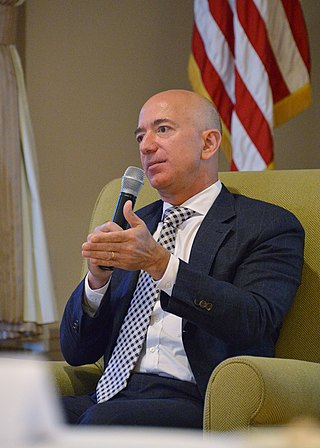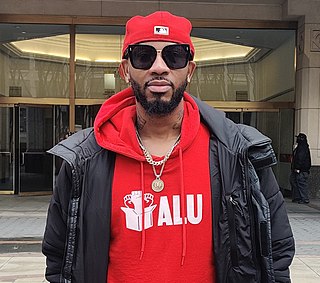Related Research Articles
A360 Media, LLC, formerly American Media, Inc. (AMI), is an American publisher of magazines, supermarket tabloids, and books based in New York City. Originally affiliated with only the National Enquirer, the media company's holdings expanded considerably in the 1990s and 2000s. In November 2010, American Media filed for Chapter 11 bankruptcy protection due to debts of nearly $1 billion, but has continued to buy and sell magazine brands since then.

Amazon.com, Inc., doing business as Amazon, is an American multinational technology company, engaged in e-commerce, cloud computing, online advertising, digital streaming, and artificial intelligence. It is considered one of the Big Five American technology companies; the other four are Alphabet, Apple, Meta, and Microsoft.

Jeffrey Preston Bezos is an American businessman, media proprietor and investor. He is the founder, executive chairman, and former president and CEO of Amazon, the world's largest e-commerce and cloud computing company. He is the second wealthiest person in the world, with a net worth of US$ 207 billion as of May 19, 2024. He was the wealthiest person from 2017 to 2021, according to both the Bloomberg Billionaires Index and Forbes.
Paul Davis is a British-American software developer best known for his work on audio software (JACK) for the Linux operating system, and for his role as one of the first two programmers at Amazon.com.

Amazon Web Services, Inc. (AWS) is a subsidiary of Amazon that provides on-demand cloud computing platforms and APIs to individuals, companies, and governments, on a metered, pay-as-you-go basis. Clients will often use this in combination with autoscaling. These cloud computing web services provide various services related to networking, compute, storage, middleware, IoT and other processing capacity, as well as software tools via AWS server farms. This frees clients from managing, scaling, and patching hardware and operating systems. One of the foundational services is Amazon Elastic Compute Cloud (EC2), which allows users to have at their disposal a virtual cluster of computers, with extremely high availability, which can be interacted with over the internet via REST APIs, a CLI or the AWS console. AWS's virtual computers emulate most of the attributes of a real computer, including hardware central processing units (CPUs) and graphics processing units (GPUs) for processing; local/RAM memory; Hard-disk(HDD)/SSD storage; a choice of operating systems; networking; and pre-loaded application software such as web servers, databases, and customer relationship management (CRM).

1-Click, also called one-click or one-click buying, is the technique of allowing customers to make purchases with the payment information needed to complete the purchase having been entered by the user previously. More particularly, it allows an online shopper using an Internet marketplace to purchase an item without having to use shopping cart software. Instead of manually inputting billing and shipping information for a purchase, a user can use one-click buying to use a predefined address and credit card number to purchase one or more items. Since the expiration of Amazon's patent, there has been an advent of checkout experience platforms, such as ShopPay, Simpler, PeachPay, Zplit, and Bolt which offer similar one-click checkout flows.

Brad Stone is an American journalist and author. He is the editor of Bloomberg Businessweek since January 2024. He is the author of the books The Everything Store: Jeff Bezos and the Age of Amazon (2013), Amazon Unbound: Jeff Bezos and the Invention of a Global Empire (2021), The Upstarts: How Uber, Airbnb, and the Killer Companies of the New Silicon Valley are Changing the World, and Gearheads: the Turbulent Rise of Robotic Sports.

MacKenzie Scott is an American novelist and philanthropist. As of January 2024, she has a net worth of US$40.6 billion, owning a 4% stake in Amazon, the company her then-husband, Jeff Bezos, founded. As such, Scott is the third-wealthiest woman in the United States and the 47th-wealthiest individual in the world. Scott was named the world's most powerful woman by Forbes in 2021 and one of Time's 100 most influential people in 2020.

Amazon.com has been criticized on many issues, including anti-competitive business practices, its treatment of workers, offering counterfeit or plagiarized products, objectionable content of its books, tax and subsidy deals with governments.
Thomas Austin Alberg was an American lawyer and businessman, founder and managing partner of the venture capital firm Madrona Venture Group, and a director of Amazon.com from 1996 to 2019. In addition to investing in many high tech startups, he was one of the earliest investors in Amazon. At Madrona, some of Alberg's investments included Impinj, a RFID technology start-up, online real estate brokerage Redfin, business management as-a-service provider Apptio and Isilon Systems, a storage software provider which was later acquired by the Emc Corporation.

Amazon Go is a chain of convenience stores in the United States and the United Kingdom, operated by the online retailer Amazon. The stores are cashierless, thus partially automated, with customers having the ability to purchase products without being checked out by a cashier or using a self-checkout station. As of 2023, there are 43 open and announced store locations in Seattle, Chicago, Los Angeles, London and New York City.

Amazon HQ2 is Amazon's corporate headquarters in National Landing in Crystal City, Virginia and an expansion of the company's headquarters in Seattle, Washington. Phase I, which has capacity for 14,000 employees, opened in June 2023. Construction on Phase II is delayed and there is no timeline for development.

Andrew R. Jassy is an American business executive who is the president and chief executive officer (CEO) of Amazon. Before being appointed by Jeff Bezos and the Amazon board during the fourth quarter of 2020, Jassy had been the SVP and CEO of Amazon Web Services from 2003 to 2021.

Amazon is an American multinational technology company which focuses on e-commerce, cloud computing, and digital streaming. It has been referred to as "one of the most influential economic and cultural forces in the world", and is one of the world's most valuable brands.
"Unfulfilled" is the ninth episode of the twenty-second season of the American animated television series South Park. The 296th overall episode of the series, it premiered on Comedy Central in the United States on December 5, 2018. It is the first of a two-part story arc that concludes the season.

In January 2020, the FTI Consulting company claimed that in May 2018 with "medium to high confidence" the phone of Jeff Bezos had been hacked by a file sent from the WhatsApp account of the crown prince of Saudi Arabia, Mohammed bin Salman. The Saudi Arabian embassy to the United States has denied the allegations. Billionaire Jeff Bezos, the owner of The Washington Post newspaper and founder of the company Amazon, engaged FTI Consulting in February 2019 after the National Enquirer in January 2019 reported details of Bezos's affair. FTI Consulting did not link the National Enquirer to the hack. In December 2021, the FBI stated they could not find proof to substantiate claims that Saudi Arabia hacked Jeff Bezos phone, and has considered an investigation into those allegations a low priority.

Christian Smalls is an American labor organizer known for his role in leading Amazon worker organization in Staten Island, a borough in New York City. He is the president and founder of the Amazon Labor Union (ALU) since 2021.
Bezos Expeditions is an American investment firm based in Mercer Island, Washington. It serves as a family office for Amazon.com founder Jeff Bezos by managing his personal investments. The firm invests both in early and late stage ventures of companies in different sectors.

A Community Banana Stand is a fruit stand operated by the American company Amazon around its Seattle headquarters and Arlington headquarters, offering free bananas to passersby. Originally proposed by then-CEO Jeff Bezos, the first Community Banana Stand opened in South Lake Union in December 2015.

Jennifer Bates is an American labor organizer known for her role in leading Amazon worker organization in Bessemer, Alabama.
References
- 1 2 Rey, Jason Del (February 13, 2020). "Jeff Bezos's first employee: Amazon "scares me"". Vox. Archived from the original on March 25, 2023. Retrieved March 7, 2024.
- 1 2 3 4 5 6 7 8 9 10 Stone, Brad (2018). The Everything Store: Jeff Bezos and the Age of Amazon (Updated with a new preface ed.). New York, NY Boston London: Back Bay Books/Little, Brown and Company. ISBN 978-0-316-21926-6.
- 1 2 3 4 5 Cook, John (June 14, 2011). "Meet Amazon.com's first employee: Shel Kaphan" (Interview). Interviewed by John Cook. GeekWire . Retrieved May 2, 2024.
- 1 2 3 Cannon, Craig (September 6, 2016). "Employee #1: Amazon" (Interview). Interviewed by Craig Cannon. Y Combinator. Retrieved May 2, 2024.
- 1 2 3 Bixenspan, David (October 22, 2023). "This Is What Amazon's First Employees Are Up To Today". SlashGear. Archived from the original on October 31, 2023. Retrieved March 7, 2024.
- ↑ "Kaphan Foundation". Influence Watch. n.d. Retrieved May 2, 2024.
- 1 2 3 Pinchin, Karen; Bourg, Anya; Jacoby, James (February 13, 2020). "Exclusive: Amazon's First Employee Calls Company a "Huge and Unstoppable Force"". pbs.org. Archived from the original on October 27, 2023. Retrieved March 7, 2024.
- ↑ "Shel Kaphan". pbs.org. Archived from the original on March 7, 2024. Retrieved March 7, 2024.
- ↑ Jacoby, James; Bourg, Anya; Robertson, Megan (February 18, 2020). "Amazon Empire: The Rise and Reign of Jeff Bezos". Frontline. Season 2020. Episode 12. Kaphan's portion of the program starts at 1:47:03. PBS. KSPS. Archived from the original on December 2, 2023. Retrieved March 8, 2024.